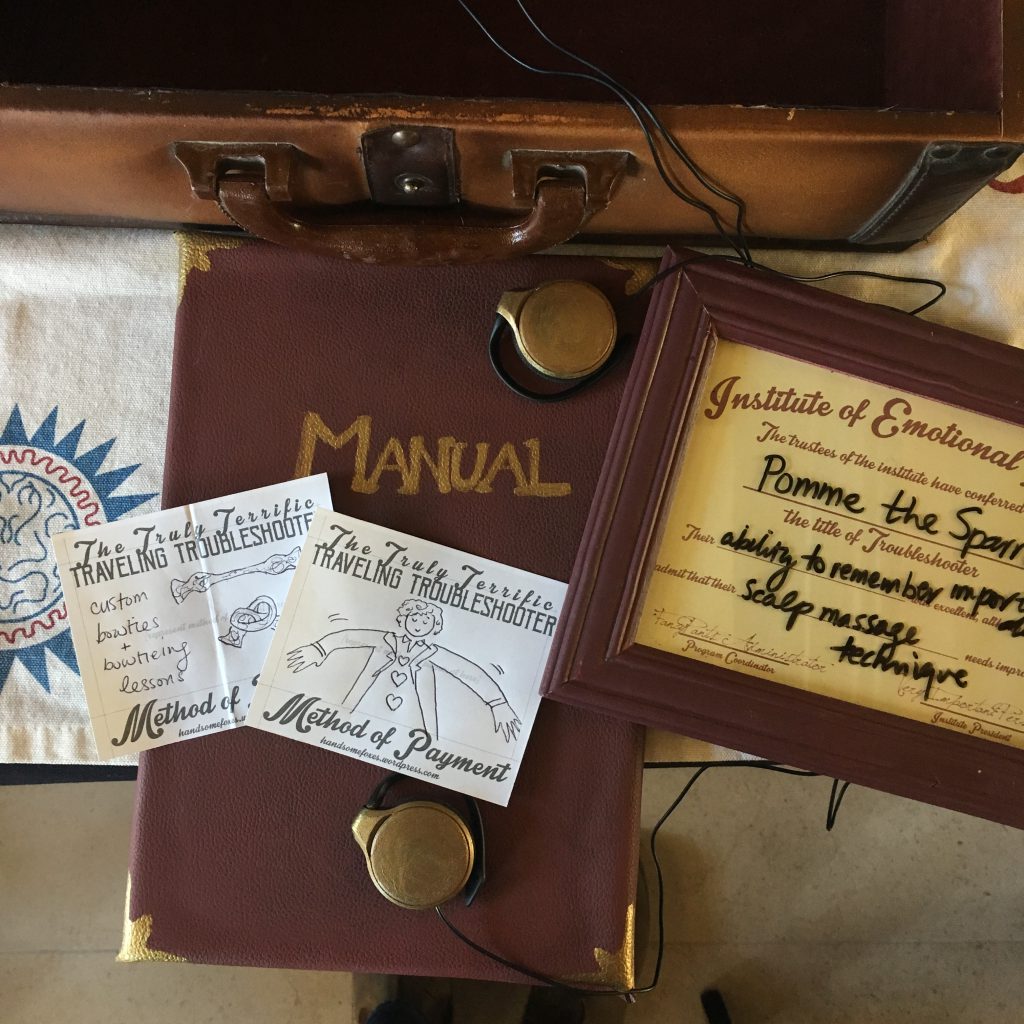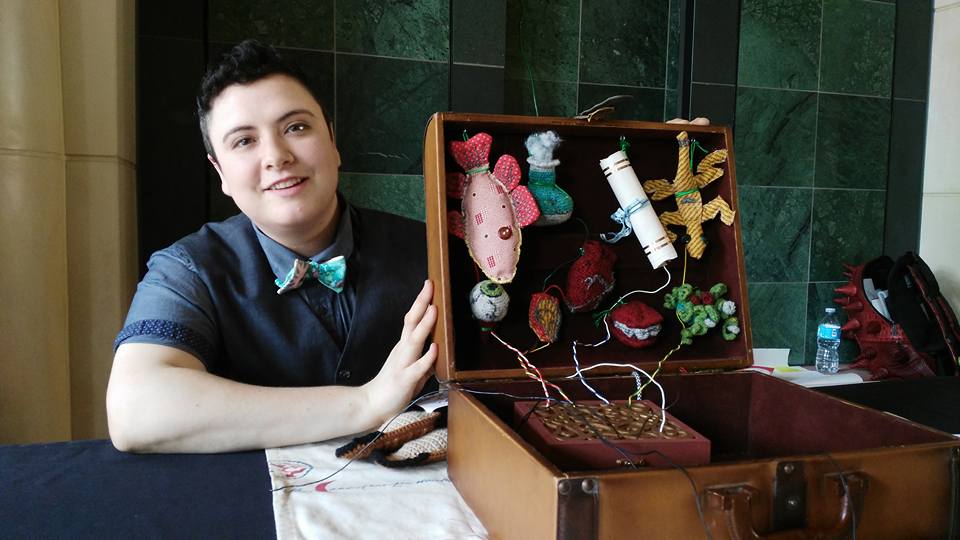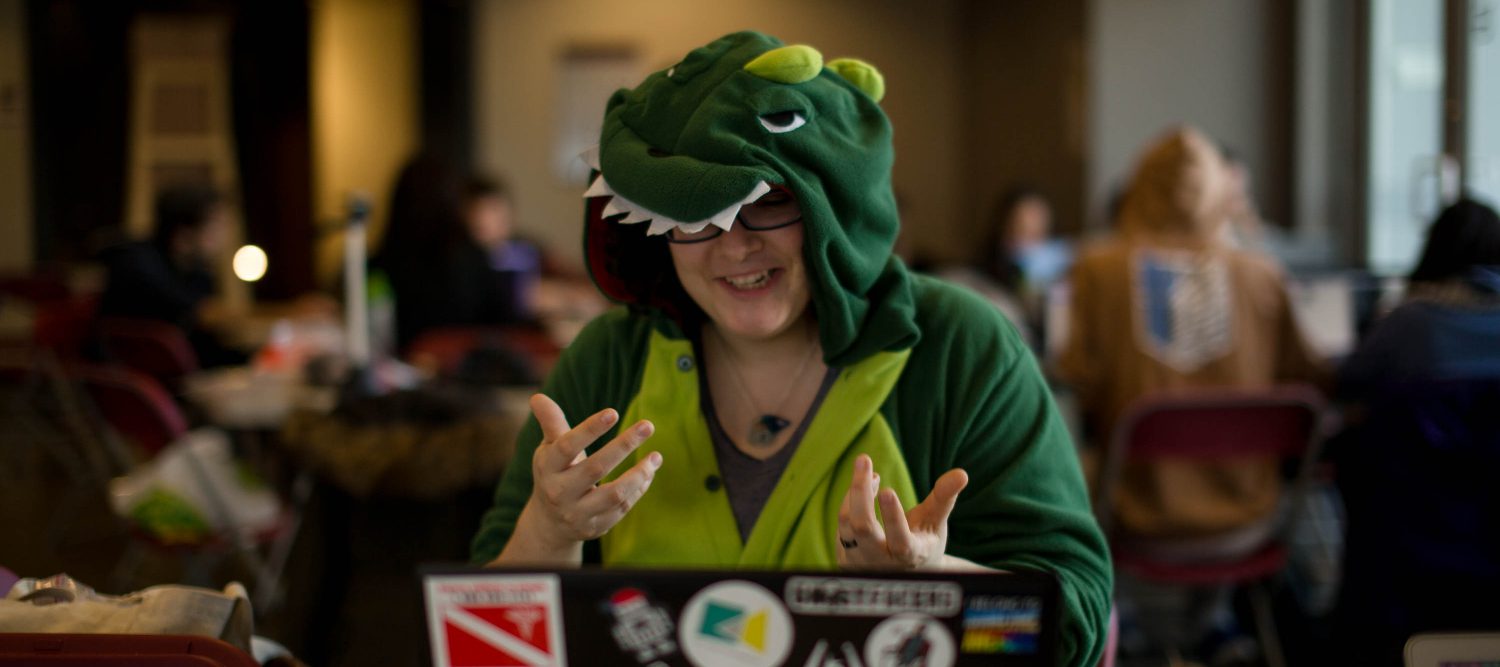[My trip to QGCon 2017 and this writeup about the experience were sponsored by the lovely folks from ReFiG (Refiguring Innovation in Games). You can learn more at refig.ca. This blog post is cross-posted on their website, and was written for that venue, so my usual readers may be familiar with some of what I have written here – like, you know, who I am.]
The Truly Terrific Traveling Troubleshooter at QGCon 2017
Here is a bit of context for those who may not know me. The 2017 Queerness and Games conference was my first queer games conference as an out nonbinary queer person, having come out in 2016. It is only in the past few years that I have been exposed to language that described my personal experiences with gender and sexuality, and there was some time between knowing the words and deciding that I should come out. Going to QGCon this year, therefore, had a fair bit of personal significance for me. I started making games in January 2013, and my work as a designer addresses intersectional feminist issues.

[Photo by Jess Marcotte]
For this year’s Queerness and Games conference, I was there to showcase a game called The Truly Terrific Traveling Troubleshooter, which is a physical/digital hybrid game about emotional labour, radical softness, and the “traveling other.”
What I mean by emotional labour is “the frequently invisible work of caring, keeping others’ in mind and taking their needs into account, managing one’s own mood and masking so-called ‘unpleasant’ emotions for the benefit of others, managing other people’s emotions, both by not causing upset to begin with and by helping others feel better, and any number of other activities in line with these that are far too many to count” (Marcotte and Squinkifer 2017).

[Photo by Jess Marcotte]
When I talk about radical softness for this game, I am referring to both the physical construction and aesthetic of the game and to a specific mindset that is common to some feminist art circles. All the objects in the game were handcrafted by Dietrich Squinkifer and myself through traditionally feminine-coded crafts such as crochet, sewing, and embroidery. The objects are “cute” and “squishy”, but are contained within the hard shell of carry-on sized suitcase. Radical softness, both as an aesthetic and as a way of being in the world, can also refer to the conscious decision not to be “hardened” just because that is what the world seems to demand of us. It refers to making a choice to be vulnerable, embracing softness, cuteness and traditionally “femme” aesthetics. It also refers to finding strength in our most vulnerable moments, whether with respect to our feelings, to the challenges that we might face with mental or phyiscal illnesses, or the situations that we are faced with as a result of life in a kyriarchical society.
The “traveling other” is a concept that Squinky and I use to talk about the relative instability of some advisors and advice-givers over others. The classic figure of the traveling fortune teller, for example, is frequently “othered” due to their identity, which may be a marginalized one along several axes (gender, sexuality, class, race, etcetera). In contrast, white male advisors tend to be of high social status, perhaps advising nobility or holding a trusted position within a community.
In The Truly Terrific Traveling Troubleshooter, one player takes on the role of a trained Troubleshooter who specializes in activities such as active listening and problem-solving. The other player is a Customer who, through provided prompts, generates a made-up Trouble to be worked through. After hearing out the problem, the Troubleshooter raises the issue of (fictional) payment, which is then negotiated with the Customer. After they have agreed, the Customer represents their method of payment on a coupon, which they hold onto until the end of the game. Next, the Troubleshooter makes use of the objects in the SUITCASE (Suitcase Unit Intended To Cure All Sorts of Emotions) to inspire their discussion and reach a resolution. Once the Troubleshooter has examined the different angles of the trouble and given the Customer their advice, the Customer then decides whether or not the Troubleshooter has earned their pay. [You can read a longer description on the game’s website here: http://handsomefoxes.wordpress.com.]
At least, in theory, the troubles are meant to be fictionalized (although there’s no rule against using a real trouble, and players are encouraged to generate a problem based on their lived experience). At the QGCon arcade, The Truly Terrific Traveling Troubleshooter was very warmly received, but I was surprised to find that very few Customers, when prompted, decided to raise a fictional trouble. Instead, most people asked for advice about real troubles. Although some were, upon further discussion, exaggerated or a situation that the player had faced in the past, most people raised real issues that they were currently facing, demonstrating a great deal of vulnerability and trust for the game (and for us, as designers). As I moderated the game or took on the role of Customer or Troubleshooter myself, I have to admit that I was very concerned about whether or not the game would be effective and feel safe for those who had just revealed a part of themself to a relative stranger. As it turns out, the attendees of QGCon proved to be sensitive and kind to each other, and the rules of the game helped them to give, overall, quite decent advice to one another. It was a heartening experience.

[Photo by Jess Marcotte]
One of the conference organizers who isn’t also a member of this game development team (Squinky was one of the organizers) played the game with me mid-Sunday afternoon. I won’t reveal what we discussed here, but at the end of the conference, during the closing session, organizers were asked to reveal their favourite moment of the entire conference. For that organizer, it was the experience of playing our game.
For me, these moments of human connection between players are the things that I most strive for in much of my design work. It is always excellent to see my and my team’s design decisions validated when players experience these unexpected instances of real feeling for another human, one that they might already know very well, or not at all. I was so glad to be able to bring this game to QGCOn.

[Photo by Jill Binder]
[As a result of my Arcade duties, I was only able to see a few of the many excellent sessions at QGCon this year. The highlights for me were the “Post Mortems: ‘Making Queer Games'” session featuring Josie Noronha, Kara Stone, and Yifat Shaik, the “Out of Sheer Spite” microtalks session moderated by Kris Ligman, and the roundtable on “Invisible Gender and Sexual Identities in the Queer Community,” which turned out to be a much broader intersectional discussion about identity, and T. L. Taylor’s keynote, “Play as Transformative Work,” about streaming communities.]
WORKS CITED
Marcotte, J. R. & Squinkifer, D. 2017, ‘Radically Soft Design and the Truly Terrific Traveling Troubleshooter’, paper presented to CGC: Imagined Realities, Carleton University, Ottawa, March 17th 2017.





